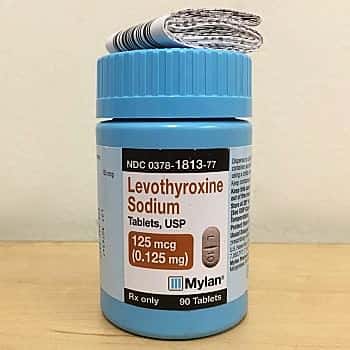
Levothyroxine, or T4 thyroid hormone, is a very old medication. Scientists first extracted this compound from pig thyroid glands more than 100 years ago, but no drug maker marketed the synthetic form of the hormone until the 1950s. When it was introduced under the brand name Synthroid, endocrinologists embraced it. They believed that a synthetic product would vary less from lot to lot than a biological medication. Consequently, once they established a patient on an appropriate dose, they wouldn’t have to keep adjusting it. Brand name Synthroid can be pricey, however, so many people take a generic formulation. Do patients have any problems when they have to switch generic levothyroxine?
How Often Do You Switch Generic Levothyroxine?
Q. I have taken generic levothyroxine for many years after my thyroid was removed. Recently, my pharmacy chain changed the manufacturer. I was taking Mylan and was told it was no longer available in my strength (125 mcg). I was switched to Lannett. Then after only two months, I was switched again to Sandoz.
So I have taken levothyroxine by three different manufacturers in less than six months. I’ve heard it is not good to change manufacturers. Can you tell me if this is a problem? If so, what can I do about it?
What Happens If You Switch Generic Levothyroxine?
A. It doesn’t sound as if you have experienced symptoms of under- or overdosing from these switches. That is the main concern: while generic manufacturers can generally maintain consistency within their lines of levothyroxine, the dose isn’t always comparable between generic drug makers. Nor can doctors simply switch generic levothyroxine in for brand-name Synthroid at the same dose and assume all will be well. They may need to do testing and adjust the dose of the new formulation until symptoms disappear.
If you’ve not experienced problems, you don’t need to do anything. If, however, you have had difficulty with symptoms of inadequate or excess thyroid hormone, you may need to find a pharmacy willing to help. It should be able to supply you with levothyroxine from the same generic manufacturer for a reasonable time.
Symptoms of Inadequate Thyroid Hormone:
Many people with hypothyroidism complain of constant fatigue, muscle pain, dry skin, thinning hair, constipation, brain fog, depression and other problems. When they take an appropriate dose of levothyroxine, such symptoms should fade. (Some individuals feel best if they get some T3 along with the T4.) If they must switch generic levothyroxine formulations as you have had to, the dose may not be comparable. Consequently, they may suffer the same symptoms.
Signs of Excess Thyroid Hormone:
On the other hand, sometimes the opposite happens when patients switch generic levothyroxine. They may be troubled with heart palpitations, tremor, diarrhea, excessive sweating, anxiety, insomnia and high blood pressure, among other problems. Sometimes they notice these symptoms when they switch from one generic formulation to another. The formulations may not be strictly equivalent to each other in the way they affect the body.
Learn More:
You can learn more about the treatment of hypothyroidism, the use of brand-name vs. generic levothyroxine and the controversy over desiccated thyroid hormone in our Guide to Thyroid Hormones. You may also wish to listen to Show 1096: What You Need to Know About Treating Thyroid Disease.


